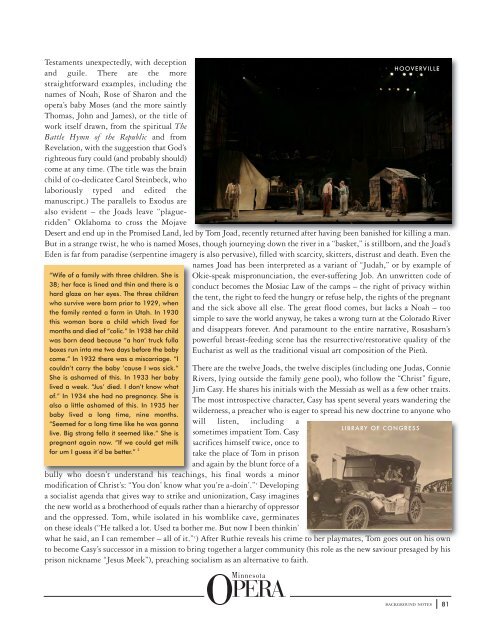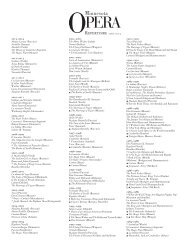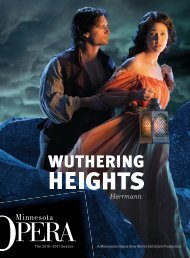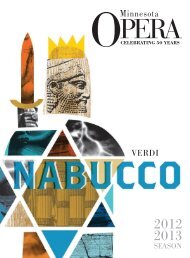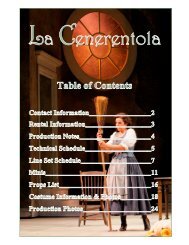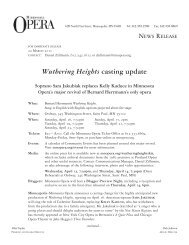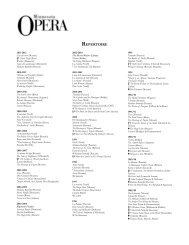Create successful ePaper yourself
Turn your PDF publications into a flip-book with our unique Google optimized e-Paper software.
Testaments unexpectedly, with deception<br />
and guile. There are the more<br />
straightforward examples, including the<br />
names of Noah, Rose of Sharon and the<br />
opera’s baby Moses (and the more saintly<br />
Thomas, John and James), or the title of<br />
work itself drawn, from the spiritual The<br />
Battle Hymn of the Republic and from<br />
Revelation, with the suggestion that God’s<br />
righteous fury could (and probably should)<br />
come at any time. (The title was the brain<br />
child of co-dedicatee Carol Steinbeck, who<br />
laboriously typed and edited the<br />
manuscript.) The parallels to Exodus are<br />
also evident – the Joads leave “plagueridden”<br />
Oklahoma to cross the Mojave<br />
Desert and end up in the Promised Land, led by Tom Joad, recently returned after having been banished for killing a man.<br />
But in a strange twist, he who is named Moses, though journeying down the river in a “basket,” is stillborn, and the Joad’s<br />
Eden is far from paradise (serpentine imagery is also pervasive), filled with scarcity, skitters, distrust and death. Even the<br />
“Wife of a family with three children. She is<br />
38; her face is lined and thin and there is a<br />
hard glaze on her eyes. The three children<br />
who survive were born prior to 1929, when<br />
the family rented a farm in Utah. In 1930<br />
this woman bore a child which lived for<br />
months and died of “colic.” In 1938 her child<br />
was born dead because “a han’ truck fulla<br />
boxes run inta me two days before the baby<br />
come.” In 1932 there was a miscarriage. “I<br />
couldn’t carry the baby ‘cause I was sick.”<br />
She is ashamed of this. In 1933 her baby<br />
lived a week. “Jus’ died. I don’t know what<br />
of.” In 1934 she had no pregnancy. She is<br />
also a little ashamed of this. In 1935 her<br />
baby lived a long time, nine months.<br />
“Seemed for a long time like he was gonna<br />
live. Big strong fella it seemed like.” She is<br />
pregnant again now. “If we could get milk<br />
names Joad has been interpreted as a variant of “Judah,” or by example of<br />
Okie-speak mispronunciation, the ever-suffering Job. An unwritten code of<br />
conduct becomes the Mosiac Law of the camps – the right of privacy within<br />
the tent, the right to feed the hungry or refuse help, the rights of the pregnant<br />
and the sick above all else. The great flood comes, but lacks a Noah – too<br />
simple to save the world anyway, he takes a wrong turn at the Colorado River<br />
and disappears forever. And paramount to the entire narrative, Rosasharn’s<br />
powerful breast-feeding scene has the resurrective/restorative quality of the<br />
Eucharist as well as the traditional visual art composition of the Pietà.<br />
There are the twelve Joads, the twelve disciples (including one Judas, Connie<br />
Rivers, lying outside the family gene pool), who follow the “Christ” figure,<br />
Jim Casy. He shares his initials with the Messiah as well as a few other traits.<br />
The most introspective character, Casy has spent several years wandering the<br />
wilderness, a preacher who is eager to spread his new doctrine to anyone who<br />
will listen, including a<br />
sometimes impatient Tom. Casy<br />
sacrifices himself twice, once to<br />
take the place of Tom in prison<br />
and again by the blunt force of a<br />
HOOVERVILLE<br />
LIBRARY OF CONGRESS<br />
bully who doesn’t understand his teachings, his final words a minor<br />
modification of Christ’s: “You don’ know what you’re a-doin’.” 1 Developing<br />
a socialist agenda that gives way to strike and unionization, Casy imagines<br />
the new world as a brotherhood of equals rather than a hierarchy of oppressor<br />
and the oppressed. Tom, while isolated in his womblike cave, germinates<br />
on these ideals (“He talked a lot. Used ta bother me. But now I been thinkin’<br />
what he said, an I can remember – all of it.” 1 ) After Ruthie reveals his crime to her playmates, Tom goes out on his own<br />
to become Casy’s successor in a mission to bring together a larger community (his role as the new saviour presaged by his<br />
prison nickname “Jesus Meek”), preaching socialism as an alternative to faith.<br />
for um I guess it’d be better.” 2 81<br />
background notes


